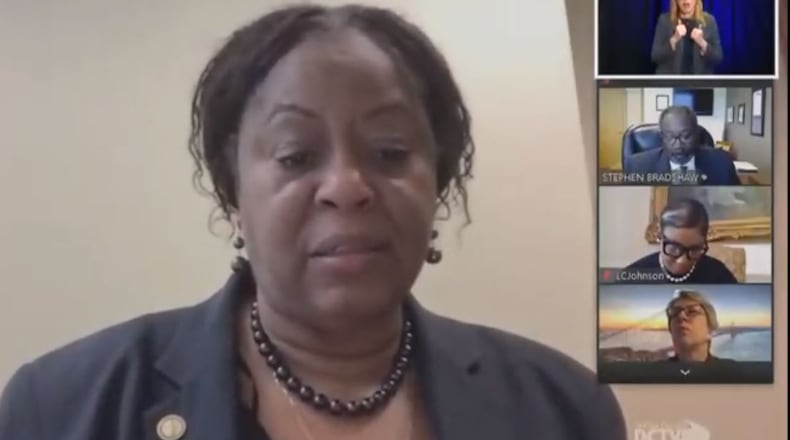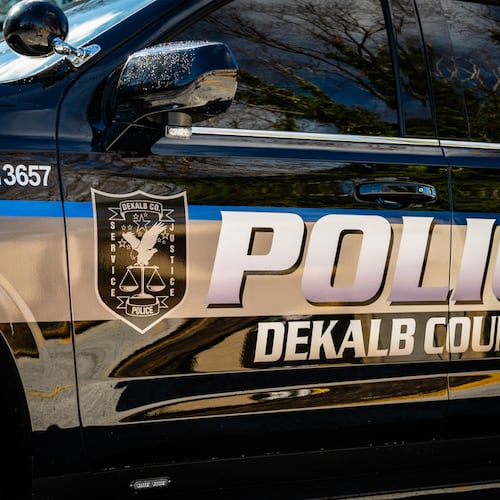DeKalb County commissioners clashed Tuesday over funding for a long-awaited senior center, reflecting the tense conversations that local governments will likely have for months and years to come as they endure economic fallout from the coronavirus pandemic.
The $5.5 million contract for a new East DeKalb community and senior center ultimately earned the commission’s approval by a 6-1 vote. But not before Commissioner Jeff Rader tried — and failed — to have a vote postponed until the pandemic’s financial implications become clearer.
Commissioner Lorraine Cochran-Johnson said she was “absolutely shocked” by the push to delay the project, saying it hadn’t come up in previous discussions.
Commissioner Mereda Davis Johnson said funding from a federal block grant and the county’s capital improvement project fund has long been set aside to replace the aging facility on Bruce Street. She said any further delay would be an affront to the Lithonia-area seniors eagerly awaiting the new building.
“I would like for them to move across the street while they're alive,” Davis Johnson said. “And while they can appreciate it.”
The new facility will include a multipurpose room, kitchen, lounge, fitness rooms and classrooms, as well as a sewing room, technology room and billiards parlor. The construction contract awarded to Diversified Construction of Georgia runs through Dec. 31, 2022.
Rader said his attempt to delay a decision on the contract, which was also supported by Commissioner Nancy Jester, was “not a critique of the project itself.” But he said the financial uncertainty presented by the ongoing pandemic made it wise not to commit funds until absolutely necessary.
“We've gotten very little information about the direction of our financial position,” Rader said.
State and local governments across the country are bracing for the economic ramifications of the pandemic, which is likely to create shortfalls in the sales tax and other revenues they rely upon. But the full brunt of the impact remains unclear and likely will for some time.
While recent sales tax collection figures are likely to be released in coming weeks, giving local governments estimates to work with moving forward, a longer term recession could be in the offing.
That will lead to tough choices for governments, who may have to cut services or postpone previously planned projects.
In DeKalb, CEO Michael Thurmond has said he’s optimistic about the county’s financial status, all things considered. The 2020 budget was constructed with a recession in mind, he said, and his administration has built a rainy day fund of more than $110 million since he took office in 2017.
Still, Tuesday’s Board of Commissioners meeting grew tense on several occasions.
Thurmond joined the online meeting as discussions heated up regarding a resolution Rader has backed. The resolution, which was not voted on Tuesday, essentially reminds the county's administration of budgetary restrictions associated with personnel costs.
Rader and a few other commissioners have questioned the feasibility of Thurmond's plan to offer hazard pay to county workers designated as "frontline employees" during the pandemic. Exact figures remain fuzzy, but the cost could run several million dollars per month.
Thurmond has repeatedly defended the plan and said the money will be there — even before it was announced DeKalb would receive around $130 million in aid from the federal CARES Act.
“One of the clear expectations of that money is that this jurisdiction would use it to reimburse and fund hazard pay,” Thurmond said Tuesday.
While Davis Johnson likened Tuesday’s discussion to “beating a dead horse to death,” Thurmond suggested that Commissioner Rader’s proposed resolution was based on a separate beef: an earlier spat about whether or not Thurmond had the authority to grant hazard pay to frontline workers in the first place.
County attorney Viviane Ernstes recently issued an opinion that Thurmond does have that authority as long as he stays within certain budgetary bounds.
“The county attorney resolved the issue,” Thurmond said. “Let's move on.”
About the Author
Keep Reading
The Latest
Featured


